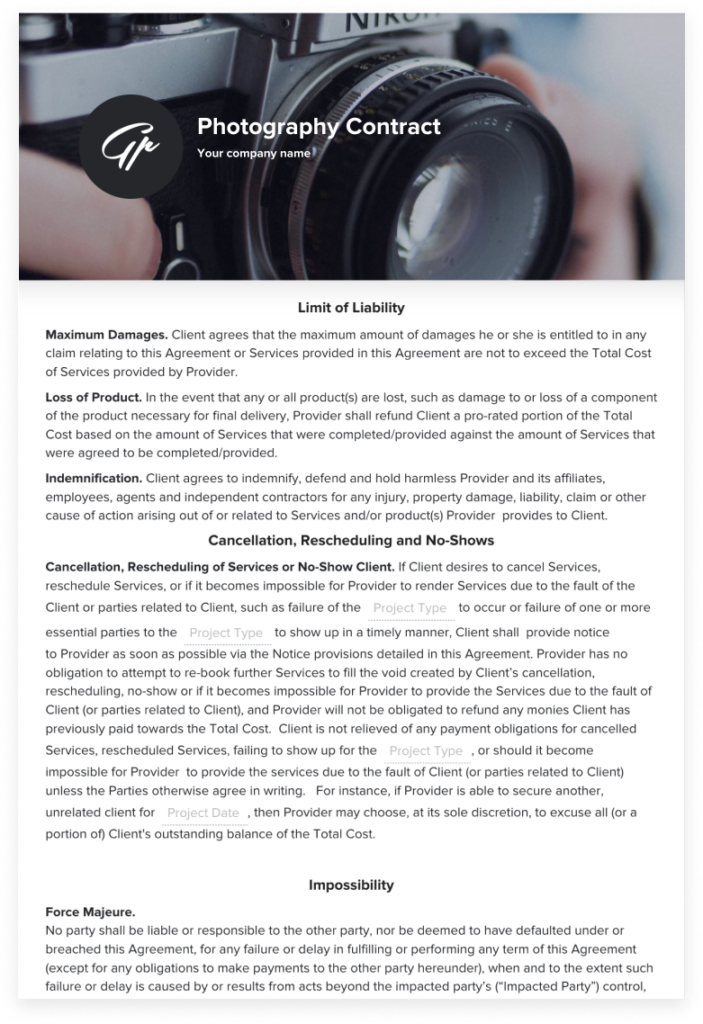
HoneyBook member and attorney Paige Griffith provides a force majeure clause template you can add to your contracts to protect your business during unexpected events, such as natural disasters and pandemics like COVID-19.

Unexpected situations happen all the time — from pandemics to natural disasters. We all hope businesses can keep moving, but sometimes these events prevent them from being able to perform their obligations.
In law, these interruptions are considered force majeure events, which translates from French to “greater force.” These unforeseeable events are beyond all parties’ control — including business owners, employees, vendors, and clients. Although it sounds like it should be, force majeure isn’t implied in common law. Instead, you’ll need to provide express protection for your business. Including a force majeure clause in your contract can help you accomplish this.
If you work in live events, this clause can protect you and your business from situations like floods, earthquakes, civil disorder, and more. Even if you don’t work events, the same clause will protect your normal workspace if any operating issues, including compromised internet connectivity, affect regular production.
The main value of a force majeure clause lies in its ability to mitigate risks, provide legal protection, offer flexibility, and contribute to the smooth functioning of contracts in the face of unpredictable events.
Including a force majeure clause in contracts is vital for both you and your clients to manage operations when unforeseen and uncontrollable events occur. It offers protection that allows everyone to suspend or terminate performance obligations without being held liable for breach of contract when faced with events beyond their control.
With the clause in place, all parties can plan in advance for force majeure outcomes and avoid unforeseen surprises, disagreements, or messy legal proceedings in the aftermath.
A force majeure clause includes three elements:
Essentially, force majeure clauses should apply to each party in the agreement, excusing them from fulfilling their contractual obligations during an unexpected event beyond their control.
Attorney and HoneyBook member Paige Griffith of The Legal Paige recommends modifying or adding three significant clauses into your existing contract templates to protect your business:
(2) Safe working environment clause
(3) Failure of company to perform services clause
“Most often I see contracts missing parts 2 and 3 in their force majeure clause,” says Paige. That means that many businesses fail to include how they’ll notify their clients about a force majeure event, as well as the consequences after a force majeure occurs. Be sure to consult with your business attorney so you can ensure these specific terms are included in your contracts.

Need a force majeure clause for your business contracts?
Copy and paste the force majeure clause sample language below into your existing contract templates. Make sure to update the bolded fields.
Force Majeure Clause Sample
No party shall be liable or responsible to the other party, nor be deemed to have defaulted under or breached this Agreement, for any failure or delay in fulfilling or performing any term of this Agreement (except for any obligations to make payments to the other party hereunder), when and to the extent such failure or delay is caused by or results from acts beyond the impacted party’s (“Impacted Party”) control, including, but not limited to, the following force majeure events (“Force Majeure Events”): (a) acts of God; (b) a natural disaster (fires, explosions, earthquakes, hurricane, flooding, storms, explosions, infestations), epidemic, or pandemic; (c) war, invasion, hostilities (whether war is declared or not), terrorist threats or acts, riot or other civil unrest; (d) government order or law; (e) actions, embargoes or blockades in effect on or after the date of this Agreement; (f) action by any governmental authority; (g) national or regional emergency; (h) strikes, labor stoppages or slowdowns or other industrial disturbances; and (i) shortage of adequate power or transportation facilities. The Impacted Party shall give Notice within [number] days of the Force Majeure Event to the other party, stating the period of time the occurrence is expected to continue. The Impacted Party shall use diligent efforts to end the failure or delay and ensure the effects of such Force Majeure Event are minimized. The Impacted Party shall resume the performance of its obligations as soon as reasonably practicable after the removal of the cause. In the event that the Impacted Party’s failure or delay remains uncured for a period of [number] days following Notice given by it, the other party may thereafter terminate this Agreement upon Notice.
RELATED POST